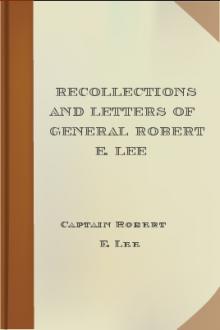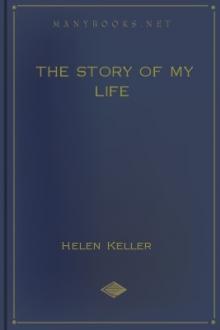Recollections and Letters of General Robert E. Lee by Captain Robert E. Lee (howl and other poems .txt) 📕

- Author: Captain Robert E. Lee
- Performer: -
Book online «Recollections and Letters of General Robert E. Lee by Captain Robert E. Lee (howl and other poems .txt) 📕». Author Captain Robert E. Lee
“Your father, R. E. Lee.
“Miss Mildred Lee.”
Just after the intermediate examinations, he writes to Mildred again: “Lexington, Virginia, February 16, 1867.
“My Precious Daughter: I have wished to answer your letter of the 2d for some days, but have not been able. The intermediate examinations which were in progress when it arrived continued ten entire days, and since their termination the necessary arrangements for the resumption of studies, and the reorganisation of the classes, have occupied my time not devoted to other pressing matters. The students generally passed very creditable examinations. Many of your friends were distinguished. The ordeal through which the higher classes passed was as severe as any I ever witnessed. Colonel Johnston [William Preston Johnston, the son of General Albert Sidney Johnston, who fell at Shiloh. He had recently been elected to the chair of History and Literature at Washington College.] has arrived and entered upon his duties. He is living at the hotel with his wife and six sweet little children, being unable to procure a house, and the college being too poor to build one for him. We have other professors also houseless.
Robert has returned to his ‘broken-back cottage,’ though he confesses to having enjoyed great pleasure during his visit to Baltimore. He dwells with delight upon his intercourse with the Misses –, whom he considers angels upon earth, without wings. His account of them increases my desire to get them to Virginia. Miss – once promised me to have Fitzhugh. Tell her I will release her from her engagement if she will take Rob. He was also much gratified at being able to spend a week with you, and I am getting very anxious for your return.
The winter has passed, the snow and ice have disappeared, and the birds have returned to their favourite resorts in the yard. We have, however, a sea of mud around us, through which we have to plunge, but I hope the pleasant air and sun now visiting us will soon dissipate it. I am glad you are enjoying yourself among such kind friends, but do not remain too long, as you may detain Cousins Eleanor and George from the Eastern Shore. Markie has sent me a likeness of you on porcelain, from the negative taken by the celebrated Plecker, which she carried with her to Philadelphia. It is very good, but I prefer the original…. Everybody seems anxious for your return, and is surprised you can stay so long from your papa. May God bless and keep you, my dear child, is the constant prayer of “Your devoted father, R. E. Lee.”
Before Mildred returned to Lexington she received one more letter from my father, in which he advises her of the two routes to Lexington, and tells her some college news:
“Lexington, Virginia, February 23, 1867.
“My Precious Daughter: Agnes wishes you to purchase some articles for her, and your mother and sister may have some commissions, which I fear will reduce your purse to an inconvenient collapse. I therefore send a check for – dollars, which I hope will enable you to gratify their wishes and serve as a reserve for your own wants. I hope you are well and passing your time profitably as well as pleasantly. The cadets are under the impression that you are at the Patapsco Institute, and will expect to find you, on your return, more agreeable than ever.
They are labouring so industriously in mental culture that they believe every one is similarly engaged. I went last evening to the celebration of the anniversary of the Washington Society, and was much pleased with the speeches. It was held in the Methodist church, which was filled to overflowing. The institute and Ann Smith [Female Academy]
were represented. Your sisters were present, and as they were both absent from breakfast this morning I fear so much learning made them sleepy. They were also at a cadet hop on the 21st, and did not get home till between two and three A. M. on the 22d. I suppose, therefore, they had ‘splendid times’ and very fresh society. We were somewhat surprised the other morning at Mrs. Grady’s committing matrimony. I missed, at our chapel exercises, Captain Grady and our acting chaplain, but did not know at the time what prevented their attendance. I heard afterwards that they had put the happy pair in the stage and sent them on their way rejoicing. She is now Mrs. Richard Norris, and has gone to Baltimore. It will be but fair now that Captain Grady should go to Baltimore and bring us a young lady from there in return for his mother. If you see Miss Armistead, ask her to be ready on short notice, as we are a people of few words in this region, and proceed in all matters in a businesslike way. Agnes, I suppose, has told you of all matters of gaiety and fashion. She has, no doubt, too, kept you advised of the progress of young Baxter and of the deeds of ‘Thomas the Nipper.’ They are both flourishing, and are much admired…. The roads are so muddy that my evening rides have been suspended, and I see nobody…. You must write me when to expect you.
The stage from Staunton now crosses during the night, and, when the roads are favourable, arrives about two A. M. When the roads are unfavourable, it gets in generally in time for an early breakfast.
The canal-boats have resumed their trips now, so you will have a choice of routes from Richmond, if you conclude to go there. All unite with me in much love, and I am, always,
“Your father, R. E. Lee.”
From Lexington I had gone to Baltimore for a short visit, and had spent a week with Mildred at the home of our cousin, Mr. George Washington Peter, near Ellicott City. Soon after getting back to my farm, I received the following letter from my father, still trying to help me along in my work:
“Lexington, Virginia, February 8, 1867.
“My Dear Son: I was very glad to learn from your letter of the 31st ult. that you had enjoyed your visit to Baltimore, for I feared when you left us that you might have a visit from your shaking enemy. I trust, however, that he has now left you never to return. Still be prudent and watch his approach closely. I hope you may be able to procure some good mules in Richmond, as it is a matter of importance to your operations. If you can get the lime delivered at ten cents, I do not know a more economical application to your land. I believe you will be repaid by the first crop, provided it acts as I think it will. Of this you must judge, and I can only say that if you can accomplish it, and wish to try, I can send you $300, and will send it by draft to you, or to any one in Baltimore that you will designate, as soon as I hear from you. I commend you for not wishing to go in debt, or to proceed faster in your operations than prudence dictates.
I think it economy to improve your land, and to begin upon the system you prefer as soon as possible. It is your only chance of success, so let me know. I have to write in haste, as the examination is in progress, and I have to be present. George and Robert both came up to-day in the subjects in which they are respectively weakest, so give them your good wishes. I received yesterday a letter from Mildred regretting your departure from Baltimore, and expressing the pleasure she derived from having been with you even a short week. I hope she will continue well and return to us soon. We are all about as you left us. The weather has moderated and the ice disappeared from the river, though the boats have not yet resumed their trips. Mud predominates now instead of snow…. Wishing you all happiness, I am, Your affectionate father, R. E. Lee.
“Robert E. Lee, Jr.”
The Robert and George mentioned here were two of his nephews whom he was educating at the college, the sons, respectively, of his brothers, Sydney Smith Lee and Charles Carter Lee. They were members of his household and were treated as his own family.
To my brother Fitzhugh he writes at this time the following, chiding him for his extravagance in a Christmas gift, and asking for some data of the movements of his command. It is full of good advice, encouragement, and affection:
“Lexington, Virginia, February 26, 1867.
“My Dear Fitzhugh: You must not think because I write so seldom that you are absent from my thoughts. I think of you constantly, and am every revolving in my mind all that concerns you. I have an ardent desire to see you reestablished at your home and enjoying the pleasure of prosperity around you. I know this cannot be accomplished at once, but must come from continuous labour, economy, and industry, and be the result of years of good management. We have now nothing to do but to attend to our material interest which collectively will advance the interests of the State, and to await events. The dominant party cannot reign forever, and truth and justice will at last prevail. I hope I shall be able to get down to see you and Rob during the next vacation. I shall then have a more correct apprehension of existing circumstances, and can follow your progress more satisfactorily. I was very much obliged to you for the nice eye-glasses you sent me Xmas, and asked your mother and the girls to thank you for them, which I hope they did. I fear they are too nice for my present circumstances, and do not think you ought to spend anything, except on your farm, until you get that in a prosperous condition. We have all, now, to confine ourselves strictly to our necessities…. While you are your own manager you can carry on cultivation on a large scale with comparatively less expense than on a small scale, and your profits will of course be greater. I would commence a system of progressive improvement which would improve your land and add steadily to your income. I have received, lately, from Fitz Lee a narrative of the operations of his division of cavalry. I requested Custis to write to you for a report of your operations during the winter of 1863-4
down to April 18,





Comments (0)